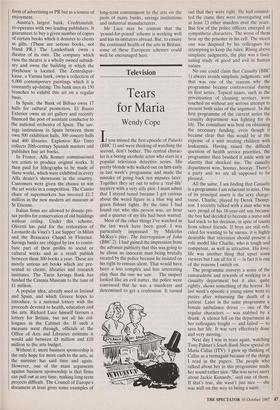Television
Tears for Maria
Wendy Cope
If you missed the first episode of Pulaski (BBC 1) and were thinking of watching the second, don't bother. The central charac- ter is a boring alcoholic actor who stars in a popular television detective series. His pretty blonde wife walked out on him early in last week's programme and made the mistake of going back ten minutes later. Together they set out to solve a 'real-life' mystery with a very silly plot. I must admit that I stayed tuned because I got curious about the weird figure in a blue wig and green fishnet tights. By the time I had found out who this person was, an hour and a quarter of my life had been wasted.
Most of the other things I've watched in the last week have been good. I was particularly impressed ' by Malcolm McKay's play, The Interrogation of John (BBC 2). I had gained the impression from the advance publicity that this was going to be about an innocent man being brutally treated by the police because he insisted on his right to remain silent. That would have been a less complex and less interesting play than the one we saw. The suspect looked like an evil nutter, the police were convinced that he was a murderer and determined to get a confession. It turned out that they were right. He had commit- ted the crime they were investigating and at least 13 other murders over the years. But few of the police officers emerged as sympathetic characters. The worst of them beat up the prisoner in his cell. The nicest one was despised by his colleagues for attempting to keep the rules. Rising above simplistic judgments, the play was a fasci- nating study of good and evil in human nature.
No one could claim that Casualty (BBC 1) always avoids simplistic judgments, and that was one of the reasons why the programme became controversial during its first series. Topical issues, such as the privatisation of cleaning services, were touched on without any serious attempt to present both sides of the argument. In the first programme of the current series the casualty department was fighting for its life. The consultant was bent on obtaining the necessary funding, even though it became clear that this would be at the expense of a unit treating children with leukaemia. Having raised the difficult question of health service priorities, the programme then brushed it aside with an alacrity that shocked me. The casualty department won, hooray, hooray. There's a party and we are all supposed to be pleased.
All the same, I am finding that Casualty is a programme I am reluctant to miss. One of its principal assets is the sexy charge- nurse, Charlie, played by Derek Thomp- son. I recently talked with a man who was very proud of his 18-year-old son because the boy had decided to become a nurse and had stuck to his decision, in spite of taunts from school friends. If boys are still ridi- culed for wanting to be nurses, it is highly desirable that television should present a role model like Charlie, who is tough and competent, as well as attractive. His love- life was another thing that upset some viewers but I am all for it — in fact it is one of the reasons I switch on. '
The programme conveys a sense of the camaraderie and rewards of working in a casualty department but it also, quite rightly, shows something of the horror. In last week's episode a young nurse went to pieces after witnessing the death of a patient. Later in the same programme a female ambulance driver — one of the regular characters — was stabbed by a drunk. A silence fell on the department as her colleagues fought — and failed — to save her life. It was very effectively done and very moving.
Next day I was in tears again, watching Tony Palmer's South Bank Show special on Maria Callas (ITV). I grew up thinking of Callas as a termagant because of the things I read in the papers. The people who talked about her in this programme made her sound rather nice. 'She was never nasty about Jackie Kennedy,' said one of them. If that's true, she wasn't just nice — she was well on the way to being a saint.


























































 Previous page
Previous page